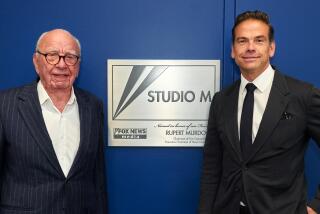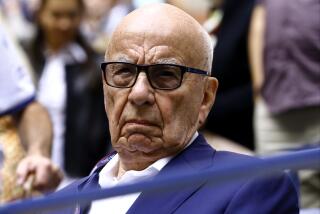Murdock Gets OK to Take Dole Private
- Share via
After clinching control of the world’s largest fruit and vegetable distributor Wednesday, billionaire David H. Murdock said he’s ready for his next project: telling the planet to eat more of what his company sells.
Murdock, chairman and chief executive of Dole Food Co., won shareholders’ approval to purchase the 76% of the company he doesn’t already own for $1.4 billion, or $33.50 a share, and the assumption of about $1 billion in debt.
Taking the company private, he said, would allow him to expand Dole’s operations around the globe and develop new products without having to worry about pleasing investors.
He said it also would allow him to finance scientific research on nutrition and health that Dole can use to market its produce and fulfill the chairman’s personal vision of a healthier, slimmer America.
“It takes capital and we will be spending capital to teach people how to eat,” the 79-year-old Murdock said in an interview in his office at the company’s Westlake Village headquarters. “I’ve never been sick a day in my life. I’m healthy and I think I can make other people healthy too.”
The veteran deal maker and self-professed “fish-vegetarian” started Dole’s health and nutrition campaign last year, when the company published an “Encyclopedia of Foods” in conjunction with scientists at the Mayo Clinic and UCLA and built a $1.5-million food science and nutrition laboratory at Dole headquarters.
The lab’s advisor, Dr. David Heber, director of UCLA’s Center for Human Nutrition, said he and other scientists have begun studying most of the world’s fruits and vegetables to pinpoint their health-benefiting compounds and to develop more potent varieties that Dole could bring to market.
Heber acknowledged that the fruits of the research will be a valuable marketing tool in reaching health-conscious consumers. But he said the whole project also is Murdock’s “personal passion.”
According to Murdock, he fully intends to use the research to tout the health benefits of what Dole sells, from fresh pineapple and bananas to bagged salads and canned fruit.
Labels on Dole’s bags of baby spinach, for instance, soon might carry information on the green’s eyesight-aiding substance lutein. The ultimate goal would be to have labels that explain to consumers what size serving they must eat to get the benefits.
In addition to the research conducted at Dole, Murdock said he has earmarked company funds for nutrition research at eight universities.
He said he also is designing a 300-room health and nutrition resort -- similar to Dallas’ famed Cooper Institute, though that is a not-for-profit entity -- near Dole headquarters.
The kind of expensive research Murdock is undertaking probably wouldn’t have gone over well with Wall Street.
“Now we can do whatever we want to do -- within reason,” Murdock said with a grin. “We are not beholden to Wall Street and the stock market.”
Analysts said Dole, which had sales of $4.4 billion last year, probably should never have been publicly traded, given the volatile nature of agriculture -- and Murdock’s tight oversight as its longtime controlling shareholder.
It already was a “quasi-private company,” said Heather Jones of BB&T; Capital Markets in Richmond, Va. Murdock and other management, she said, were not “as forthcoming and communicative as they could have been” for a company whose shares traded on the New York Stock Exchange.
The sale to Murdock is expected to be final this week. He initially offered to pay $29.50 a share but was forced to boost that after shareholders objected.
For his part, Murdock acknowledged he wanted to be free to pursue his vision of how Dole should expand.
“Taking the company private was not the easiest thing I’ve done in my life,” he said. “Now we can grow faster.”
More to Read
Inside the business of entertainment
The Wide Shot brings you news, analysis and insights on everything from streaming wars to production — and what it all means for the future.
You may occasionally receive promotional content from the Los Angeles Times.









